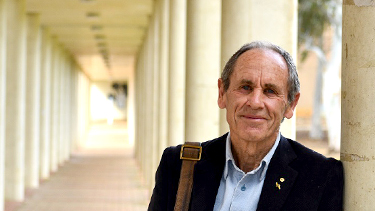GETTING ACTIVE IN THE FIGHT AGAINST OBESITY

Dick Telford AM has been an influencer for much of his life – from the time he started out in his career as a 19-year-old Physical Education teacher, to the current day as a 74-year-old Professor advocating the need for change.
A Professorial Fellow of Physical Literacy at the University of Canberra’s Research Institute for Sport & Exercise (UCRISE), Dick wants to change the collective narrative away from negatives associated with diet. He wants the focus to be on the positive benefits of being physically active at a young age, effectively instilling an active lifestyle for the years well beyond childhood.
This is a departure from the messages we hear about the dangers of sugar and fats. Instead, in a less-polarising manner, he suggests that a physically active lifestyle may assist our brain’s appetite centres to balance energy in and out, offsetting our tendency toward becoming overweight. He also suggests that it could also be argued that an inactive lean person may sometimes be less healthy than an active person who is overweight.
“This is not just my opinion, there are research findings to support what I am saying,” Dick said.
It is no exaggeration to claim that there is plenty of data backing this – much of it is a result of years of research by Dick and his team.
In many respects, Dick’s journey started from reflection about his own childhood. “My love for physical activity started when I was five or six years old, when I loved running around the backyard kicking a football,” he said.
This memory went on to establish a theme for much of his research, as he looked into the benefits of physical activity from an early age.
“If I were tasked with reducing the prevalence of obesity across Australia, I would start with the children,” he said.
“Our primate DNA has us motivated to be physically active and to play. Young animals love to play – a human being is no different. Our DNA encourages us to play, because play is involved with physical and psychological development. Once we get to our reproductive stage, our instincts tell us to save energy instead.”
Dick has long been involved in ground-breaking research, including the Lifestyle Of Our Kids (LOOK) study alongside his son, Dr Rohan Telford, Dr Lisa Olive and colleagues from The Canberra Hospital.
The pioneering LOOK study demonstrated how physical activity establishes a template for a healthy life, with the additional benefits of improved mental health and academic achievements.
Dick’s desire to devote his life to improving the health of a population was born out of frustration at the lack of physical activity in our schools. He has now established significant research supporting what he intuitively understood, and he is encouraging anyone who will listen to do more to promote an active lifestyle from childhood.
But it has been a long road, with governments long seeming resistant and unable to respond practically to this logical need. It would appear that Dick has had enough of the rhetoric.
“I am fed up with talking about obese kids – we want action!” he said.
Now though, action appears to be happening on two fronts. The Queensland government has unveiled its vision to improve physical literacy, and the team at UC are working with Early Childhood Learning centres to trial an innovative physical literacy-based curriculum in 20 Early Childhood schools.
“This is initiative is being driven by my son Rohan, and while it’s only in its 10th week, educators are already noticing a difference,” he said.
Then there is the adoption of an extension to the LOOK study by the South Australian government, with a trial to start in 30 primary schools next year with the Physical Education and Physical Literacy concept.
A successful outcome is likely to see it introduced across the entire state of South Australia. In collaboration with Sport Australia, Hockey Australia, Flinders University and the Australian Council for Health, Physical Education and Recreation (ACHPER), the trial will involve a Physical Literacy coach working across 10 schools, up-skilling and supporting classroom teachers to provide quality physical education and the physical literacy required to prepare kids for a physically active life.
Why this sustainable, government-owned approach is not being trialled by other jurisdictions is a mystery, but Professor Telford is excited by the developments thus far.
“The Holy Grail of our research is being able to apply it for the benefit of the community,” he said.
While canvassing his opinions on the current state of physical activity, it is easy to overlook the role that Dick has played as a positive influence on our sporting culture.
From playing three games in the Victorian Football League (VFL), now the Australian Football League (AFL), for Collingwood and Fitzroy, to winning the prestigious J. J. Liston Trophy for the best player in the Victorian Football Association in 1968, to coaching the Victorian cricket team to back-to-back Sheffield Shield titles, to his involvement with the Blue Earth Foundation, to setting up the philosophy of Sports Science and inaugural staff at the Australian Institute of Sport, to being the pre-eminent coach of distance runners in Australia, to his current role at the UCRISE – how can this great career be overlooked?
We need to listen to Dick when he tells us: “We need to go with the flow of our DNA instead of fighting it.”
In other words, we were born loving physical activity and having fun, and the key is to nurture this basic instinct through childhood and adolescence so that physical activity becomes ingrained as an important part of our lifestyle for the rest of our lives.
And in case you were wondering: Dick is also involved in work with colleagues directed at promoting physical activity in aged care, at the other end of the spectrum of life.